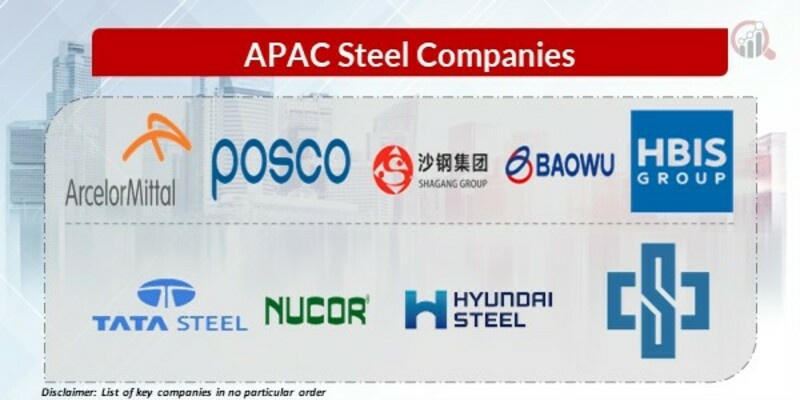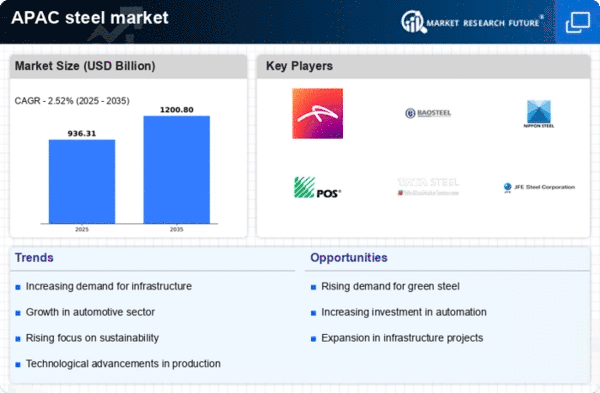Top Industry Leaders in the APAC Steel Market
 This growth is fueled by rapid urbanization, industrialization, infrastructure development, and a shift in global trade dynamics. Steel serves as the backbone of the region's economic progress, playing a vital role in construction, manufacturing, and diverse industries.
This growth is fueled by rapid urbanization, industrialization, infrastructure development, and a shift in global trade dynamics. Steel serves as the backbone of the region's economic progress, playing a vital role in construction, manufacturing, and diverse industries.
Key Players and Strategies: The landscape is teeming with domestic and international giants vying for market share. Here are some prominent players and their strategic maneuvers:
-
Chinese Steelmakers: Dominating the scene are Baowu Steel Group, China Baowu Steel Group, and Shagang Group. Their strategies revolve around:-
Capacity Consolidation: Mergers and acquisitions aim to optimize production footprints and enhance efficiency. -
Technological advancements: Investments in electric arc furnaces and automation processes lead to cost reduction and sustainability. -
Product diversification: Focus on high-value steels like AHSS and UHSS caters to evolving industry needs.
-
-
Japanese Steelmakers: Nippon Steel Corporation and JFE Holdings remain significant players, employing strategies like:-
Global expansion: Joint ventures and partnerships in Southeast Asia tap into emerging markets. -
Specialty steel focus: Expertise in high-precision and niche steel products differentiates them. -
Sustainability initiatives: Environmental consciousness attracts eco-conscious customers.
-
-
Indian Steelmakers: Tata Steel and Jindal Steel and Power Limited are key players, adopting strategies such as:-
Modernization and expansion: Investments in new plants and technology upgrades boost capacity. -
Downstream integration: Expanding into value-added steel products secures higher margins. -
Cost leadership: Leveraging economies of scale and operational efficiency to compete effectively.
-
Factors Influencing Market Share: Several factors determine a player's success in this dynamic market:
-
Production Cost: Efficiency in raw material sourcing, energy consumption, and production processes are crucial. -
Product Quality and Diversification: Offering a diverse range of high-quality steel products caters to specific industry needs. -
Technological Innovation: Adoption of advanced technologies like automation and sustainability practices provides a competitive edge. -
Distribution Network and Customer Service: Strong logistics and responsive customer service build brand loyalty. -
Government Policies: Supportive policies and infrastructure development initiatives create favorable market conditions.
Key Companies in the steel market include
-
ArcelorMittal (Luxembourg)
-
POSCO (South Korea)
-
Shangang Group (Spain)
-
NSSMC Group (Japan)
-
China Baowu Group (China)
-
HBIS Group (China)
-
Tata Steel Group (India)
-
Nucor Corporation (US)
-
Hyundai Steel Company (South Korea)
-
China Steel Company (Taiwan)
Recent Developments:
-
August 2023: China announces plans to reduce steel production capacity by 20 million tons annually until 2025, aiming to curb emissions and excess supply. -
September 2023: India's steel exports decline due to rising domestic demand and global economic slowdown. -
October 2023: Nippon Steel and POSCO sign a joint venture agreement to build a cold-rolling mill in Indonesia, targeting the Southeast Asian market. -
November 2023: Baowu Steel Group announces a partnership with Siemens to develop smart steel plant solutions. -
December 2023: Tata Steel commissions a new blast furnace in India, expanding its production capacity. -
January 2024: JFE Holdings announces plans to invest in hydrogen-based steelmaking technology to achieve carbon neutrality.










